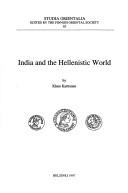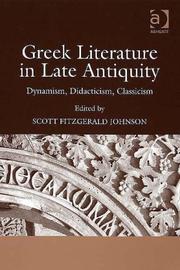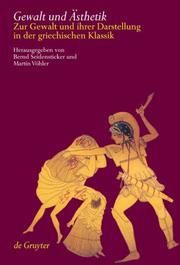| Listing 1 - 10 of 22 | << page >> |
Sort by
|

ISBN: 9519380353 9789519380353 Year: 1997 Volume: 83 Publisher: Helsinki Finnish Oriental society
Abstract | Keywords | Export | Availability | Bookmark
 Loading...
Loading...Choose an application
- Reference Manager
- EndNote
- RefWorks (Direct export to RefWorks)
Book
ISBN: 2843210666 9782843210662 Year: 2004 Volume: *6 Publisher: Paris : Desjonquères,
Abstract | Keywords | Export | Availability | Bookmark
 Loading...
Loading...Choose an application
- Reference Manager
- EndNote
- RefWorks (Direct export to RefWorks)

ISBN: 9780754656838 0754656837 9781315585864 9781317124733 9781317124740 Year: 2006 Publisher: Aldershot, England ; Burlington, VT : Ashgate Pub.,
Abstract | Keywords | Export | Availability | Bookmark
 Loading...
Loading...Choose an application
- Reference Manager
- EndNote
- RefWorks (Direct export to RefWorks)
Book
ISBN: 9780674417243 0674417240 Year: 2014 Volume: 69 Publisher: Cambridge : Harvard University Press,
Abstract | Keywords | Export | Availability | Bookmark
 Loading...
Loading...Choose an application
- Reference Manager
- EndNote
- RefWorks (Direct export to RefWorks)
Epic poetry, Greek --- Greek literature, Hellenistic --- Greek poetry --- History and criticism --- Epic poetry, Classical --- History and criticism. --- Thebes (Greece) --- In literature. --- Epic poetry, Greek - History and criticism --- Greek literature, Hellenistic - History and criticism
Book
ISBN: 8876948627 9788876948626 Year: 2005 Volume: 17 Publisher: Alessandria Edizioni dell'Orso
Abstract | Keywords | Export | Availability | Bookmark
 Loading...
Loading...Choose an application
- Reference Manager
- EndNote
- RefWorks (Direct export to RefWorks)
Book
ISBN: 9782600007658 2600007652 9783774942318 Year: 2019 Volume: 65 Publisher: Vandoeuvres : Bonn : Fondation Hardt ; Habelt,
Abstract | Keywords | Export | Availability | Bookmark
 Loading...
Loading...Choose an application
- Reference Manager
- EndNote
- RefWorks (Direct export to RefWorks)
Greek literature, Hellenistic --- History and criticism --- Greek literature --- Greek philology --- Greek language --- Classical languages --- Indo-European languages --- Classical philology --- Style --- Conferences - Meetings --- Linguistique --- Littérature grecque. --- Greek literature, Hellenistic - History and criticism
Book
ISBN: 9782221239162 2221239164 Year: 2019 Publisher: Paris: Robert Laffont,
Abstract | Keywords | Export | Availability | Bookmark
 Loading...
Loading...Choose an application
- Reference Manager
- EndNote
- RefWorks (Direct export to RefWorks)
"L'oeuvre de la grande helléniste que fut Jacqueline de Romilly a enchanté d'innombrables lecteurs en leur révélant la grâce et la beauté d'une civilisation sans pareille. Ce volume rassemble l'essentiel des textes qui jalonnent cette fresque narrative. Jacqueline de Romilly y promène le reflet grec de ses lectures sur toutes choses, animée sans cesse par le sentiment que se joua là, pour l'homme en général et pour son destin personnel de femme de tête, de coeur et de culture, une révélation intime. Expérience qui a nourri son idéal humaniste. Ses émerveillements constants devant la richesse et la splendeur du patrimoine qu'elle fait découvrir ici à travers les figures de la Grèce mythologique, historique et littéraire – Homère, Hector, Achille et Alcibiade, Périclès, Platon et Socrate – sont indissociables de son approche savante. En sa compagnie, nous suivons l'invention progressive des valeurs qui nous ont façonnés : douceur, tolérance, liberté, démocratie... Car pour Jacqueline de Romilly, " ce qu'a semé la Grèce ne cesse de revenir, de resurgir ". Sa pensée est aussi celle d'une femme qui plaida pour l'enseignement des humanités afin de lutter contre toutes les formes d'obscurantisme. Ce volume contient : Hector – Homère – L'Amitié de Giraudoux avec l'hellénisme : Elpénor – L'Humanité d'Homère et les humanités – Alcibiade – La Grèce antique à la découverte de la liberté – La Littérature, ou le Passé vivant – La Douceur dans la pensée grecque – " Patience, mon coeur ! " – Ne me dis pas comment cela finit... Réflexions sur la tragédie grecque." Source : 4ème page de couverture
Greek literature, Hellenistic --- Philosophy, Ancient. --- Littérature grecque hellénistique --- Philosophie ancienne --- History and criticism. --- Greece --- Grèce --- Civilization --- Civilisation --- Philosophy, Ancient --- History and criticism --- Greek literature, Hellenistic - History and criticism --- Greece - Civilization
Book
ISBN: 9782848673462 284867346X Year: 2011 Publisher: Besançon : Presses universitaires de Franche-Comté,
Abstract | Keywords | Export | Availability | Bookmark
 Loading...
Loading...Choose an application
- Reference Manager
- EndNote
- RefWorks (Direct export to RefWorks)
Humor in literature --- Greek literature, Hellenistic --- Humour dans la littérature --- Littérature grecque hellénistique --- History and criticism --- Congresses. --- Histoire et critique --- Congrès --- Homer --- Parodies, imitations, etc. --- littérature grecque antique --- culture --- Homère - réception --- parodie --- Homère --- Homer - Parodies, imitations, etc. - Greek literature, Hellenistic - History and criticism - Studies. --- Humour dans la littérature --- Littérature grecque hellénistique --- Congrès --- Greek literature, Hellenistic - History and criticism - Congresses --- Homer - Parodies, imitations, etc. - Congresses

ISBN: 1282195816 9786612195815 3110202859 311018432X 9783110202854 9783110184327 9781282195813 6612195819 Year: 2006 Publisher: Berlin : De Gruyter,
Abstract | Keywords | Export | Availability | Bookmark
 Loading...
Loading...Choose an application
- Reference Manager
- EndNote
- RefWorks (Direct export to RefWorks)
In der Kunst der Moderne kommt den vielfältigen Erfahrungen von physischer und psychischer Gewalt eine zentrale Bedeutung zu. Die sich daraus ergebende Frage nach den Formen der Präsentation von Gewalt und nach den Gründen für das Vergnügen an tragischen Gegenständen stellt sich jedoch bereits in der griechischen Klassik in durchaus vergleichbarer Weise. Die Studien des Bandes, die aus einem Symposion des Sonderforschungsbereichs "Ästhetische Erfahrung im Zeichen der Entgrenzung der Künste" hervorgegangen sind, untersuchen nach einem Blick auf die an Gewalterfahrungen reiche Geschichte des 5. Jahrhunderts v. Chr. das Spannungsfeld von Gewalt und Ästhetik in den Bereichen von Mythos und Kult, Literatur mit dem Schwerpunkt auf der Tragödie und bildender Kunst. In modern art, central importance is accorded to the diverse experiences of physical and mental violence. The resultant question of the forms of presentation of violence and the reasons for taking pleasure in tragic objects is however one which was already posed in Classical Greece in a comparable fashion. The studies in this volume arose from a symposium run by the Collaborative Research Centers on "Esthetic experience and the dissolution of artistic limits". After reviewing the history of the 5th century B.C. with its intensive experience of violence, they examine the tension between violence and aesthetics in the fields of myth, cult, and literature with particular reference to tragedy and visual art.
Greek literature, Hellenistic --History and criticism --Congresses. --- Violence in art --Congresses. --- Violence in literature --Congresses. --- Violence in the theater --Congresses. --- Greek literature, Hellenistic --- Violence in literature --- Violence in art --- Violence in the theater --- Greek & Latin Languages & Literatures --- Languages & Literatures --- History and criticism --- Hellenistic Greek literature --- Theater --- Stage combat --- Antiquity. --- Greece. --- arts. --- literature. --- pottery.

ISBN: 3515053867 9783515053860 Year: 1990 Volume: 28 Publisher: Stuttgart : Franz Steiner,
Abstract | Keywords | Export | Availability | Bookmark
 Loading...
Loading...Choose an application
- Reference Manager
- EndNote
- RefWorks (Direct export to RefWorks)
Greek literature, Hellenistic --- Littérature grecque hellénistique --- Appreciation --- History and criticism --- Appréciation --- Histoire et critique --- Civilization, Greco-Roman. --- History and criticism. --- Littérature grecque hellénistique --- Appréciation --- Civilization, Greco-Roman --- Greco-Roman civilization --- Civilization, Classical --- Greek literature, Hellenistic - History and criticism. --- Greek literature, Hellenistic - Appreciation - Rome.
| Listing 1 - 10 of 22 | << page >> |
Sort by
|

 Search
Search Feedback
Feedback About UniCat
About UniCat  Help
Help News
News